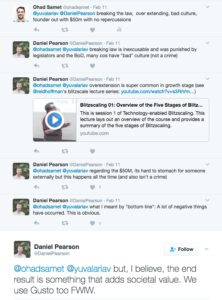This post was originally posted on the TrueAccord blog.
We are nearing the end of the sales pitch, and the exec I’m speaking to is almost convinced. I feel it: he likes the product and likes the innovation but he has to ask; he can’t let me off the hook.
He leans forward and looks me right in the eyes. And then it comes. The question.
“Tell me more about your Compliance Management System.”
Without a word, I reach into my bag, and grab a folder. It’s massive with hundreds of pages, all properly categorized: FDCPA, TCPA, FCRA, ECOA, GLBA, you-name-it. Here are the results of hundreds, maybe thousands of work hours. I slap it on the table, and it makes a loud noise even in this cavernous conference room.
We both smile. I passed the test.
I confess, my dreams have been weird lately. This is what being a founder in hard-core financial services feels like. You should be ready for prodding questions, a lot of upfront investment, and heavy oversight. We aren’t alone: companies like Standard API, LendUp, Even, Vouch, Blend Labs and others all operate in highly regulated industries. So why take on a challenge like this, instead of building a messaging app, or a video-streaming app? Why work on “boring” problems, when you can build something that bloggers will muse about and any angel investor can love?
For my co-founders and me, and for others like us, the answer is three-fold: 1) solving real problems, 2) solving hard problems, and 3) unlocking huge opportunities. A heavily regulated market is a clear signal for all three.
1. Solving real problems
77 million Americans have a debt collection related item on their credit report. 106 million are unbanked or under-banked. 5.5% of adults nationwide have used a Payday Loan in the past 5 years. Think about these numbers: these are real people with real financial problems. They struggle daily.
I don’t know if there’s a financial bubble in tech, but there’s definitely a cultural one; many of us build meta-startups that help other startups get built or are plain me-too’s. We sometimes work on cool ideas that aren’t too meaningful. I once had an engineer decline an offer to fix debt collection, only to work for a mobile gaming company and promote modern day gambling.
I want my work to touch real problems because that’s how you make a difference outside of our echo chamber. Increased regulatory scrutiny comes on the heels of unscrupulous business tactics that exploit human suffering – real problems that need solving.
2. Solving hard problems
Did I mention we spent thousands of hours on our compliance policies? It didn’t stop there. Replacing dial-for-dollars call centers with a machine learning system takes time and dedication. So does underwriting mortgages or short terms loans. These industries require an understanding of human psychology, risk management, data science, predictive analytics, customer care – and all has to be delivered to pass intense regulatory scrutiny. Lending, collections and similar processes have been done manually for decades because building a machine to make nuanced decisions is hard. It’s hard to accumulate the data required to optimize them. It’s also hard to convince investors to be patient; the pool of funders and founders they are willing to support, is surprisingly small. That’s a worthy challenge. Again, regulated markets tend to create entrenched incumbents with little incentive to change – exactly where disruption is needed.
3. Unlocking huge opportunities
Payday lenders’ annual revenues are estimated at $11B. Debt collectors’ are at $15B. Thousands of companies pop-up in both markets due to surprisingly low barriers to entry, and disappear due to the complexity of continuous operations. Increased regulation favors organized, well funded market participants that can consolidate that activity in a way that is demonstrably better than the incumbents’ approach. Technology can help us solve these problems at scale, with convincing economics, and a compelling case for compliance and information security. Here, too, regulation signals the amount of money that flows through these markets – and the size of opportunity for those who can play.
Bottom line
Regulated industries present unique challenges, and require a mindset that combines technical daring and innovation with respect to the legal framework. When you do engage, though, they can present interesting, challenging problems that have huge impact and many opportunities. This, for me, is worth the hassle.
– Ohad

